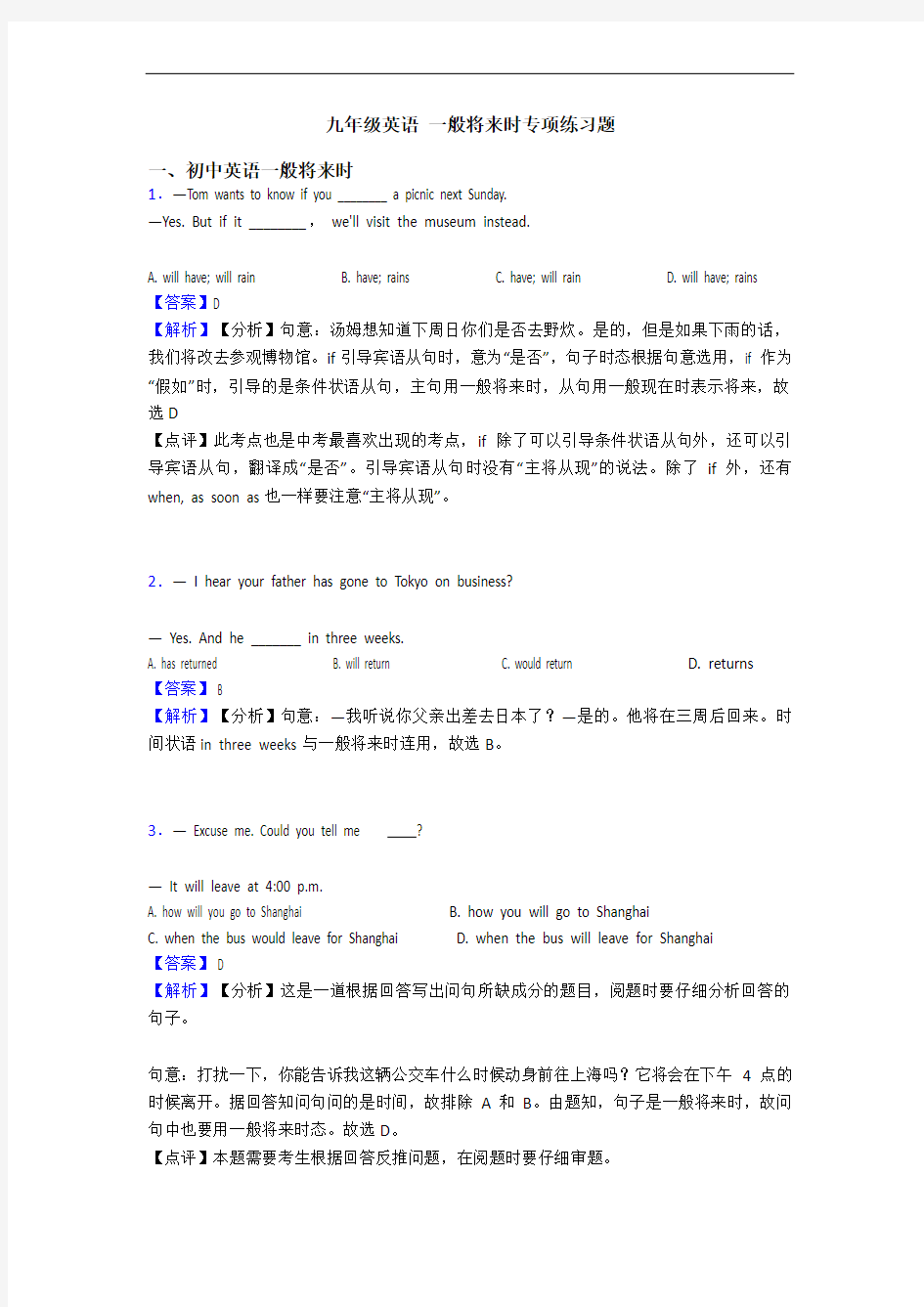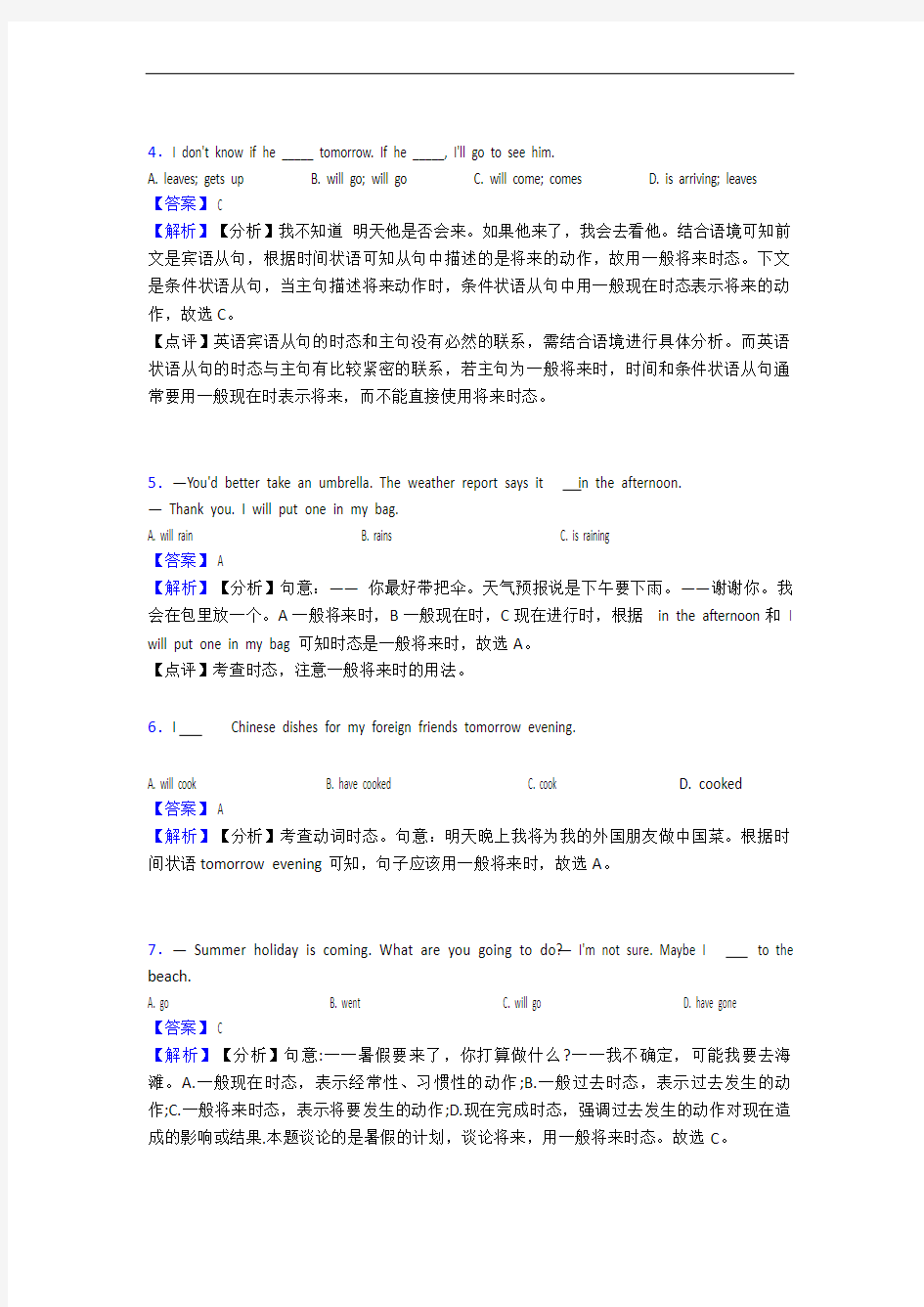

九年级英语一般将来时专项练习题
一、初中英语一般将来时
1.—Tom wants to know if you ________ a picnic next Sunday.
—Yes. But if it ________, we'll visit the museum instead.
A. will have; will rain
B. have; rains
C. have; will rain
D. will have; rains 【答案】D
【解析】【分析】句意:汤姆想知道下周日你们是否去野炊。是的,但是如果下雨的话,我们将改去参观博物馆。if引导宾语从句时,意为“是否”,句子时态根据句意选用,if 作为“假如”时,引导的是条件状语从句,主句用一般将来时,从句用一般现在时表示将来,故选D
【点评】此考点也是中考最喜欢出现的考点,if除了可以引导条件状语从句外,还可以引导宾语从句,翻译成“是否”。引导宾语从句时没有“主将从现”的说法。除了if外,还有when, as soon as也一样要注意“主将从现”。
2.— I hear your father has gone to Tokyo on business?
— Yes. And he _______ in three weeks.
A. has returned
B. will return
C. would return
D. returns
【答案】 B
【解析】【分析】句意:—我听说你父亲出差去日本了?—是的。他将在三周后回来。时间状语in three weeks与一般将来时连用,故选B。
3.— Excuse me. Could you tell me ?
— It will leave at 4:00 p.m.
A. how will you go to Shanghai
B. how you will go to Shanghai
C. when the bus would leave for Shanghai
D. when the bus will leave for Shanghai
【答案】 D
【解析】【分析】这是一道根据回答写出问句所缺成分的题目,阅题时要仔细分析回答的句子。
句意:打扰一下,你能告诉我这辆公交车什么时候动身前往上海吗?它将会在下午4点的时候离开。据回答知问句问的是时间,故排除A和B。由题知,句子是一般将来时,故问句中也要用一般将来时态。故选D。
【点评】本题需要考生根据回答反推问题,在阅题时要仔细审题。
4.I don't know if he _____ tomorrow. If he _____, I'll go to see him.
A. leaves; gets up
B. will go; will go
C. will come; comes
D. is arriving; leaves
【答案】 C
【解析】【分析】我不知道明天他是否会来。如果他来了,我会去看他。结合语境可知前文是宾语从句,根据时间状语可知从句中描述的是将来的动作,故用一般将来时态。下文是条件状语从句,当主句描述将来动作时,条件状语从句中用一般现在时态表示将来的动作,故选C。
【点评】英语宾语从句的时态和主句没有必然的联系,需结合语境进行具体分析。而英语状语从句的时态与主句有比较紧密的联系,若主句为一般将来时,时间和条件状语从句通常要用一般现在时表示将来,而不能直接使用将来时态。
5.—You'd better take an umbrella. The weather report says it in the afternoon.
— Thank you. I will put one in my bag.
A. will rain
B. rains
C. is raining
【答案】 A
【解析】【分析】句意:——你最好带把伞。天气预报说是下午要下雨。——谢谢你。我会在包里放一个。A一般将来时,B一般现在时,C现在进行时,根据 in the afternoon和 I will put one in my bag 可知时态是一般将来时,故选A。
【点评】考查时态,注意一般将来时的用法。
6.I Chinese dishes for my foreign friends tomorrow evening.
A. will cook
B. have cooked
C. cook
D. cooked
【答案】 A
【解析】【分析】考查动词时态。句意:明天晚上我将为我的外国朋友做中国菜。根据时间状语tomorrow evening可知,句子应该用一般将来时,故选A。
7.— Summer holiday is coming. What are you going to do?— I'm not sure. Maybe I to the beach.
A. go
B. went
C. will go
D. have gone
【答案】 C
【解析】【分析】句意:一一暑假要来了,你打算做什么?一一我不确定,可能我要去海滩。A.一般现在时态,表示经常性、习惯性的动作;B.一般过去时态,表示过去发生的动作;C.一般将来时态,表示将要发生的动作;D.现在完成时态,强调过去发生的动作对现在造成的影响或结果.本题谈论的是暑假的计划,谈论将来,用一般将来时态。故选C。
8.Many scientists believe that robots able to talk like humans in 50 years.
A. were
B. are
C. will be
D. have been
【答案】 C
【解析】【分析】考查动词的时态。句意:许多科学家认为,五十年过后,机器人将能够像人类一样说话。描述“五十年后”将要发生的动作或状态,用一般将来时态。故选C。
9.—May I speak to Mr. Smith?
—Sorry, he _______ Australia. But he _______ in two days.
A. has been to; will come back
B. has gone to; will be back
C. has been in; would come back
D. is leaving for; doesn't come back
【答案】 B
【解析】【分析】考查动词的时态。句意:——我可以和史密斯先生通话吗?——对不起,他去澳大利亚了。但是两天后回来。have gone to“去某地了(还没回来)”;由时间状语in two days可确定第二个空用一般将来时,故答案为B项。
10.—Do you know ______?
—The day after tomorrow.
A. when we visited the museum
B. when we will visit the museum
C. when did we visit the museum
D. when will we visit the museum
【答案】 B
【解析】【分析】句意:——你知道我们什么时候参过博物馆吗?——后天。Do you know 后接宾语从句,应使用陈述结构,因此排除C和D,根据答语The day after tomorrow.可知问句使用一般将来时,故答案是B。
【点评】考查宾语从句的语序各时态,注意宾语从句使用陈述语序,根据答语确定问句的时态。
11.If you work hard, ___________.
A. you will win a scholarship
B. you won a scholarship
C. will you win a scholarship
D. you have won a scholarship
【答案】 A
【解析】【分析】句意:如果你努力工作,你将获得奖学金。根据题干中的If you work hard,可知,此句是if引导的条件状语从句,主句要用一般将来时,故选A。
【点评】考查if引导条件状语从句的时态。
12.If you go to bed earlier, you tired in the morning.
A. will feel
B. don't feel
C. won't feel
D. didn't feel
【答案】 C
【解析】【分析】句意:如果你上床睡觉早些,在早上你就不会感觉到累了。此题考查if 引导的条件状语从句,主句一般将来时,从句用一般现在时。根据句意,故选C。
【点评】考查动词时态。掌握主将从现的句子结构。
13.Robots more heavy work for us in the future.
A. will do
B. did
C. have done
D. were doing
【答案】A
【解析】【分析】句意:在将来, 机器人将为我们做更多繁重的工作。根据in the future 可知此处用一般将来时, 故选A。
【点评】一般将来时
14.—How many children do most post-80s families have?
—One. They ______ two in the future, I guess.
A. will have
B. had
C. have
D. have had
【答案】A
【解析】【分析】句意:——大部分80后的家庭有几个孩子?——一个。我猜想将来他们会有两个的。A.will have将会有;B为have的原形;C为have的过去完成时。根据回答中“in the future”在将来,可知应选将来时。一般将来时的两种结构:will+动词原形或be going to do,故选A。
【点评】考查时态一般将来时,注意一般将来时的状语提示,如tomorrow,next year ,in the future等。
15.—I wonder if he ______ us tonight.
— I believe if he ______ his homework, he will join us.
A. will join; will finish
B. will join; finishes
C. joins; finishes.
【答案】 B
【解析】【分析】句意:——我想知道他今天晚上是否加入我们吗?——我相信如果他完成了作业,他会加入我们的。根据句式结构第一句是if是否,引导宾语从句,根据tonight,可知从句是将来时态;第二句if如果,引导条件状语从句,时态为主将从现,此空用一般现在时,finishes,故选B。
【点评】此题考查从句时态。要根据不同的从句和不同的语境确定句子时态。
16.—We _____ to Yun Brocade Museum with the exchange students this coming summer holiday.
—That's amazing!
A. went
B. go
C. have gone
D. will go
【答案】D
【解析】【分析】句意:——即将到来的暑假,我们将和交换生一起去云锦博物馆。——太神奇了。went是一般过去时;go是动词原形,一般现在时;have gone是现在完成时;will go是一般将来时。根据this coming summer holiday可知是将来的时间,所以用一般将来时态,故答案选D。
【点评】考查动词的时态。
17.- My aunt me to Europe for vacation next month.
- Have a good time!
A. take
B. took
C. will take
【答案】 C
【解析】【分析】句意:——我阿姨带我下个月去欧洲度假。——玩得高兴!根据next month可知, 叙述的是在将来发生的事情, 故用一般将来时态, 故选C。
【点评】一般将来时
18.— Have you watched the new movie Jurassic World, Steven?
— Not yet. I ________ it with my cousin this evening.
A. will watch
B. was watching
C. watched
D. have watched
【答案】 A
【解析】【分析】句意:——你已经看过新电影Jurassic World吗,史蒂文?——还没有,我将和我的表弟今天晚上去看。A. will watch 一般将来时态; B. was watching过去进行时;
C.watched 一般过去时;
D.have watched现在完成时态。根据否定回答,可知还没有看这个电影,所以今天晚上去看用将来时,故选A。
19.- Let's go to the community if it __________ tomorrow.
- But nobody knows if it __________ tomorrow.
A. won't rain; rains
B. doesn't rain; rains
C. doesn't rain; will rain
D. won't rain; will rain 【答案】 C
【解析】【分析】句意:——如果明天不下雨我们去社区吧。——但是没人知道明天是否会下雨。第一空中if引导条件状语从句,用一般现在时表示将来;第二空if“是否”,引导
宾语从句,根据tomorrow可知用一般将来时,故选C。
【点评】考查动词的时态。
20.—Could you tell me_______?
—In five minutes, at 10: 25.
A. when did the next underground arrive
B. when the next underground arrived
C. when will the next underground arrive
D. when the next underground will arrive
【答案】D
【解析】【分析】句意:—你能告诉我下一个地铁什么时候到吗?—五分钟后,10点25分。tell后跟宾语从句,宾语从句需用陈述句语序,A、C两项都是疑问句语序,可排除。根据答语In five minutes,结合句意语境,可知还没有到站,需用一般将来时态,故答案选D。
【点评】考查宾语从句。根据语境确定宾语从句的时态,注意陈述语序。
二、初中英语动词的时态
21.—Could you tell me __________ yesterday?
—Because my bike was broken on my way here.
A.why you came late B.why do you come late
C.why you come late D.why did you come late
【答案】A
【解析】
【详解】
句意:——你能告诉我你昨天为什么迟到吗?——因为我的自行车在来的路上坏了。
考查宾语从句。英语宾语从句中一般用陈述语序,可知排除B和D。根据宾语从句时间状语yesterday,可知宾语从句时态是一般过去时态。故选A。
22.Today’s young people can’t live without smart phones. They keep their hands on the phones whenever they go, even while they______ meals.
A.had B.will have C.were having D.are having
【答案】D
【解析】句意:如今的年轻人没有智能手机就无法生存。当他们吃饭的时候,他们随时都会拿起手机。考查动词时态辨析题。while当……的时候,表示从句动作和主句动作同时发生,常用进行时态。根据句意语境,可知选D。
23.Larry, we’re glad you have arrived. We ______ to drive to the station to meet you. A.began B.would begin C.have begun D.were beginning
【答案】D
【解析】句意:Larry,我们很高兴你来了,我们正要开车去车站接你。began一般过去时
态,开始,表示过去发生的动作;would begin将会开始,过去将来时;have begun现在完成时,表示过去发生的动作对现在的影响;were beginning正要开始。根据句意we’re glad you have arrived可知,Larry现在已经来了,因此打算开车去车站应该是过去打算去做,但还没有去做的事情,故应选D。
24.― Could you tell me when he back?
— Sure. He will come back as soon as he the classroom.
A.will come; finishes cleaning B.comes; will finish cleaning
C.will come; will finish to clean
【答案】A
【解析】试题分析:句意:——你能告诉我他将什么时候回来吗?——当然可以。他一打扫完教室就会回来。本题第一句是宾语从句,第二句是时间状语从句。根据回答He will come back---可知,本题第一空用一般将来时;第二空主句是一般将来时,as soon as引导的时间状语从句用一般现在时。故选A。
25.Unless you ________ your ID card, the teacher won’t let you in.
A.will have B.have C.had
【答案】B
【解析】
【详解】
句意:除非你有身份证,否则老师不会让你进去的。A. will have将有;一般将来时;B. have有,一般现在时态;C. had有,一般过去时态。这里是unless引导的条件状语从句,遵循主句用一般将来时,从句用一般现在时态,从句主语是you ,动词用原形。根据题意,故选B。
【点睛】
if和unless引导的条件状语从句而已算是其中一种;
主将从现常见的有以下四种情况:
一、条件状语从句的主句是一般将来时,那么从句常常用一般现在时
如:When I grow up,I’ll be a nurse and look after patients
我长大后要当一名护士,照顾病人
二、如果主句是祈使句,那么从句通常要用一般现在时
如:Don’t laugh at me when I make a mistake.
我犯错误的时候不要笑话我.
三、如果主句是含有情态动词的一般现在时,根据需要从句多用现在进行时
如:You should be quiet when you are in the reading room
在阅览室时应保持安静
四.如果if的条件状语从句遇到变换间接和直接时 ,祈使句应用not to.
如; She said not to close the window
常见的时间状语从句的连词有:as soon as,when,while ,as,until等
用在unless或if中可以是下面的用法:
I will not go boating if it rains tomorrow.
Unless you have finish your homework,I won't allow you to watch TV.
26.--Look! There____ so many noisy kids in the room!
--Haven’t you heard the saying “When the cat is away, the mice _____?”
A.have; play B.is; are going to play
C.have; are playing D.are; will play
【答案】D
【解析】
【详解】
句意“-看!房间里有许多吵闹的小孩-你没听见他们在说,当猫离开后,这些老鼠在玩吗?”。there be句型不与have连用,排除A和C,且第一空处主语为so many noisy kids,谓语用复数,排除B,第二空处when引导的从句用一般现在时,主句用一般将来时,即“主将从现”原则,故选D。
27.—Where is Tom?
—He ______ the USA.He ______ back in two months.
A.has gone to; comes B.has bee to; will be
C.has been to; comes D.has gone to; will be
【答案】D
【解析】
【详解】
句意:----汤姆在哪?---他去了美国,他将在两个月之后回来。Have been in强调“过去曾去过”之意,表示经验;have been to的意思是“过去到过而现在已返回”,它强调“最近的经历”;have gone to表示“动作的完成”,强调人已离开说话的地方。In +一段时间,用于将来时。根据句意,故选D。
28.—Where’s your father, Tom?
— He __________newspaper in the study.
A.reads B.read
C.is reading D.has read
【答案】C
【解析】
句意:--汤姆,你爸爸在哪里?--他在书房里读报纸。根据问句“汤姆,你爸爸在哪里?”,判断答语的句意是“他正在书房里读报纸。”即设空处的动作在说话时刻正在进行着,所以句子用现在进行时,现在进行时的构成:am/is/are+动词的现在分词,故答案为C。
29.I_______this mobile phone online. It is not worth buying.
A.check B.am checking C.have checked D.will check
【答案】C
【解析】
【详解】
句意:我在网上查过这部手机。它不值得买。考查动词时态辨析。check查看/核实;根据It is not worth buying.,可知check是已经完成的动作,需用现在完成时,故选C。
30.I think I _ my new project tomorrow.
A.start B.started C.will start D.was starting
【答案】C
【解析】句意:我想我明天将要开始我的新项目。本题考查动词的时态。A. start 开始,是动词原形 B. started 开始,是动词的过去式 C. will start 将要开始,是动词的将来时 D. was starting就要开始,是过去将来时。根据句意选C。